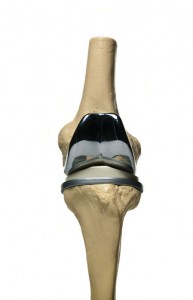Joint replacement surgery is the standard treatment for severe arthritis. Many patients understand that a joint replacement is only good for a certain period of time, but exactly how long is this? Find out more about the lifespan of joint replacements.
An artificial knee joint is not as solid and durable and the patient’s own knee. Unfortunately, these replacements do eventually wear out just like the joint that was replaced. Knee replacement implants are made out of plastic and metal, and over time, these materials start to erode and wear, much like the rubber on car tires.
Regardless, many studies now show that common types of knee replacements are lasting for longer than 20 years. One recent research trial on the long-term outcomes of implants found that the replacements were still functioning in 96 percent of patients 20 years following the original procedure. While other studies have not shown this level of success, technology and surgical techniques continue to improve, so experts predict that replacements will work for several decades.
Many patients have joint replacements of the knee that last 20 to 30 years, whereas other individuals require a repeat replacement procedure 5 to 10 years after the surgery. Revision knee replacement is often not as successful as the original surgery.
The durability of the joint replacement depends on the severity of the arthritis, the extent of joint damage, the expertise of the orthopedic surgeon, and the patient’s personal health status. On a good note, a recent report shows that only around two percent of knee replacement surgeries require a second surgery within five years of the first procedure.
Hip Replacements
 Hip replacement surgery is used to treat severe hip arthritis. An artificial hip is not as tough and durable as the patient’s own joint. The metal and plastic materials used in hip replacement wear out with use and do not last forever. Recent reports show that the most common types of hip replacements are lasting for longer than 20 years, however.
Hip replacement surgery is used to treat severe hip arthritis. An artificial hip is not as tough and durable as the patient’s own joint. The metal and plastic materials used in hip replacement wear out with use and do not last forever. Recent reports show that the most common types of hip replacements are lasting for longer than 20 years, however.
The research studies vary due to the types of hip implant prosthetics used and the type of patient who receives the replacement. One large research report showed that 80 percent of hip replacements were functioning fine after 15 years for patients who were younger than 65 years and for 94 percent of those over the age of 65 years.
Revision hip replacement only is necessary for about two percent of patients. This is a second surgery that is done within five years of the initial joint replacement. Most patients who have a hip replacement do not require a second procedure, so this is a rare occurrence.
Factors affecting the Longevity of Joint Replacements
There are some factors that appear to influence the longevity of knee replacement implants. There is no rule on the exact longevity of a joint replacement, but implant manufacturers are continually working to develop implants that will last longer.
- Patient Age – Younger patients are more active, and therefore, require a joint replacement to last much longer. Patients who have joint replacements in their 50s often require a revision during their lifetime, whereas inactive patients older than 65 years usually do not.
- Patient Activities – The more active the patient is, the more wear on the joint replacement. Many activities place excessive stress on the hip or knee joint, so the parts will wear out more quickly. Discuss what activities you should avoid when undergoing a joint replacement procedure.
- Patient Weight – The more the patient weighs, the more stress will be place on the joint implant. For this reason, it is crucial that the patient maintain a normal body weight and attempt to make the joint replacement last. Also, discuss what exercises will be useful with your physical therapist and Beverly Hills orthopedic surgeon.
- Complications – There are specific medical conditions that will lead to worrisome complications that affect joint replacements. Patients with osteoporosis should be treated for any fracture of the bone around the replacement so it does not affect the implant function. Also, patients who have invasive procedures and extensive dental work must take antibiotics to prevent bacteria from entering the joint replacement.



